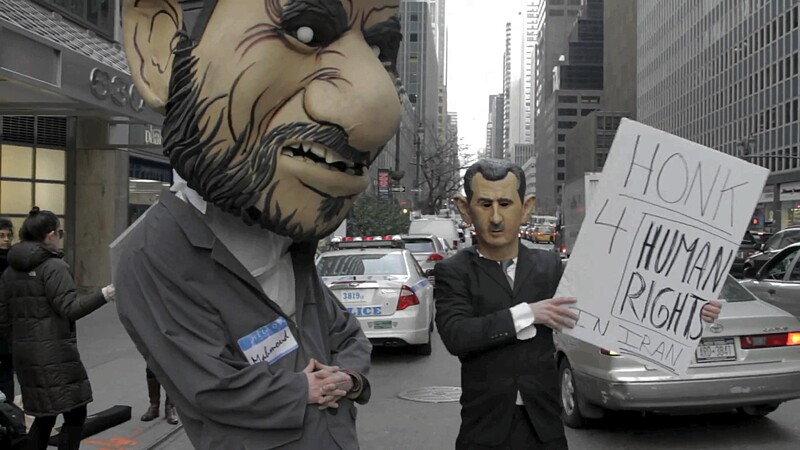Lobby Watch 18 June 2012
In my two previous blog posts, I exposed the group Iran180 as an Israel lobby astroturf project created with the help of a public relations firm whose Israeli-American president served in the IDF spokesperson’s office. This organization appears at first glance to be an edgy street activist and sophisticated human rights advocacy organization, but it seeks no donations or volunteers. In addition to the street antics, Iran180 claims to produce serious research about human rights in Iran and also to educate the public about the problems.
By no means am I an expert — or even an internet expert — on Iran. Instead, I more closely resemble Iran180’s target audience, and public relations companies pay good money for this kind of feedback. This post is an invitation to people with expertise to have a look for themselves and give their own analysis.
Nonetheless — despite my lack of expertise on Iran — I find that the work of Iran180 is often shallow, selective and even duplicitous. Some of its claims do hint at real human rights problems and abuses, but they lack context, don’t encourage empathy, and don’t foster understanding or solidarity. When these failures are viewed with the bizarre and toxic propaganda I’ve discussed in previous posts, it becomes apparent that Iran180’s purported demands are made not on behalf of Iranians but as a tactic to demonize the people, the nation and its leaders and to escalate diplomatic and even military confrontation between the United States and Iran.
The unique case of Iran’s bloody meddling in Africa, Latin America, Iraq and Afghanistan: the only nation ever to do such a thing in the history of life
I discovered an Iran180 video on the Council on Foreign Relations blog of John Campbell. Mr. Campbell has the look of an expert and CFR is a very prestigious institution, so I was surprised to find this video presented uncritically. I expect my Africa experts to assess and judge the validity of the claims in material they promote.
This video lists a handful of Iranian involvements in African countries. Many of the complaints are that Iran sells weapons to bad people — or the worst people. Selling weapons is an ugly business, and the United States government and industry are the biggest arms dealers on the planet. But Iran180 wants you to be concerned about Iran’s arms trade, so it ignores European, American and Israeli presence in this market. In the words of Dorian Corey, “That’s not a read; that’s just a fact.”That Gambia and Senegal severed relations with Iran for the reasons stated in the video is well reported and true.
The very last claim in the video is that:
Iran has reportedly deployed troops and constructed a large navy base in Eritrea.
This sounds important, especially given the proximity of Eritrea to Djibouti (the location of Camp Lemonnier, headquarters of USAFRICOM) and U.S. military allies Egypt, Saudi Arabia and Ethiopia.
They must mean the Eritrean port of Assab. This rumor originates with an Eritrean opposition group and has been denied by the Eritrean government. A leaked U.S. diplomatic cable from 2008 mentions:
An Iranian submarine was reportedly sighted in the port city of Assab on 11/24/08. A reliable embassy source obtained this information on 11/25/08 from a contact who belongs to an unknown Eritrean Army intelligence unit based in Assab.
Needless to say, Iran180’s video gives more credibility to this claim than it probably deserves. And without “a large navy base in Eritrea,” how will Iran unfurl its humongous flag atop the entire African contient and then blow up the world?
In addition to Africa, Iran180 is concerned about Iran’s meddling in Latin America and also Iraq and Afghanistan. (Cue Dorian Corey.)
Ben S. Cohen
In two other cases where Iran180’s advocacy output was taken seriously by a writer, a man named Ben S. Cohen wrote articles promoting them and their work.
On 11 February 2011, he wrote in The Huffington Post a stirring and desperately needed imperative call urging “Don’t Forget Iran”:
Watching this new video produced by the human rights NGO Iran 180, I was struck by Congressman Barney Frank’s pithy summation of what good governance involves. “No government ought to consider itself threatened by its citizens wanting to express themselves,” Frank said. “And no truly popular government need worry about that.”
His post included an Iran180 video “American Leaders Honor Iranian People” featuring warm greetings from maybe a dozen elected American officials such as Ileana Ros-Lehtinen, Brad Sherman, Debbie Wasserman Schultz, and others who never met a sanctions resolution they wouldn’t sponsor or vote for.
What’s most incredible is that this video was made in January 2011, a mere five months after Iran180 was founded. I wait longer to receive a computer-generated response to a phone call to my elected representatives, but I digress.Two months later, he wrote on Harry’s Place about Iran180’s protests against Fiat at the New York International Auto Show:
The grotesque puppet is a creation of Iran180, an energetic NYC organization that stages street theater protests against the Iranian regime and those doing business with that regime. Last September, the puppet beat Ahmadinejad himself to the front page of the New York Times, when it performed outside the UN building round about the same time the Iranian tyrant was performing inside.
It’s strange that Ben S. Cohen never mentions that he was employed by the American Jewish Committee, a participating organization of Iran180, as their Associate Director of Communications based in New York during the time Iran180 was developed and produced. This could just be a coincidence, so the fact that Ben S. Cohen follows Marco Greenberg, Iran180 and Josh Hirschland (an account executive of Thunder11) on Twitter is just circumstantial.
Women
I am curious about the validity of this video that lists the “top 10 abuses” of women by the Iranian regime. Since I do not know very much about Iran, I can’t begin to validate or debunk them. I do find some of these abuses to be unconscionable. Lapidation is indefensible regardless of whether the victim is buried to the neck or the waist. But the status of women in a society cannot be reduced to a late night talk show gimmick, and I don’t feel enlightened after watching it.
Some of the listed “abuses” are worth extracting here for the reader.- “Iranian women are eligible for only half of the inheritance that men receive.”
- “Female medical students are often denied the opportunity to study specific subject matter because there are no female instructors available to teach them, and they can’t be taught by men.”
- “Women are not allowed to sing as individuals. When they do sing, it can only be done in chorus.”
- “Women are not permitted to attend public sporting events.”
- “Iranian women are not allowed to display public acts of affection.”
- “Iranian women would not be allowed to wear a t-shirt….”
The person reading the script in this video is Christine Hauer, a former account executive for Thunder11, the public relations firm headed by Marco Greenberg that claims credit for producing Iran180.
On the topic of women’s status in Iran, it helps to listen to Iranian women.
Attitudes and knowledge
In December 2011, Iran180 published the results of a survey titled Survey of American College Students Attitudes Towards and Knowledge of Iran. As of 12 June 2012, they hosted the report on their web site but since then it has disappeared. Thumbnails still appear in Google Image search. The report does not identify any specific individual as the survey’s designer, and Iran180’s logo is on every page.
The purpose of this study was to come to a better understanding of the overall attitudes of American college students towards Iran. This was done by looking at both general knowledge of and concern for Iran’s status as violator of human rights and threat to global security as well as overall knowledge of specific policies applied by the Iranian regime.
…
Each question was designed to address a different variable, including, in sequence, overal perceptions of Iran; overall knowledge of Iran; overall importance of human rights to respondent; respondent’s perceptions of seven countries, including Iran, on the basis of their human rights record; respondent’s knowledge of specific behaviors condemned by the Iranian regime; and respondent’s attitude towards Iranian nuclear armament.
Ranking seven countries — Iran, Somalia, Syria, Burma, Chad, Belarus and Uzbekistan — by quantity of horror must have been difficult for American college students.
I want to focus on a different set of results.
Participants in the survey were asked to identify whether a range of activities that would be considered normal acceptable behavior in the west were legal in Iran. If they thought they were illegal, they were asked to identify the nature of the punishment [death, prison or a fine].
This establishes the fundamental orientalism of the survey. The activities that are “normal … in the west” are:
- public displays of affection
- being gay
- freely worshipping a religion of your choice
- wearing short sleeves (for women)
- belonging to an independent labor union
- blogging critically about the government
- wearing nail polish
Iran180 claims that all of these activities are criminal in Iran. The death penalty — increasingly regarded as a violation of basic human rights — is not a target of inquiry in this survey analysis. I just want to deal with a few of these activities.
PDA, “being gay” and apostasy
For public displays of affection, New York Times columnist Nick Kristof’s recent video and Flickr falsify this claim. I see couples touching each other and holding hands in public. If this is illegal in Iran, the country’s streets appear to be full of people engaged in civil disobedience.
The notion that “being gay” is “considered normal acceptable behavior in the west” cannot be taken seriously. Tell this to Carl Joseph Walker-Hoover or Jamey Rodemeyer. In the United States, it is legal to discriminate against LGBT people in housing and employment. Is that the privilege of being normal? And what does “being gay” even mean in Iran? International concern about Iranian people’s bodily and sexual rights is typified by arrogance, ignorance, misrepresentation and harmful errors by non-Iranian activists, but this probably won’t discourage Iran180.
Freedom to practice or quit a religion is a fundamental human right. Yousef Nadarkhani is “a Christian pastor at risk of execution for ‘apostasy’ for refusing to renounce his religion.”
Nail polish
According to Iran180, “wearing nail polish” is a crime punishable by a fine. Really? Is this how we talk about human rights to college students?
In 2009, Der Spiegel reported:
When Ahmadinejad was elected president four years ago, the controls by the moral police got noticeably tighter. Vibrantly colored fingernails, French manicures, false acrylic nails – there was a catalogue of fines for the various looks.
However, on 10 April 2012, the U.S. Treasury’s Office of Foreign Assets Control fined Essie Cosmetics, Ltd. $450,000 for exporting $33,299 of nail care products to Iran. Iran is also the seventh-largest consumer of cosmetics in the world. A Flickr search reveals flagrant, open and notorious cases of rural and urban women from all classes with painted nails.
What is the meaning of this apparent contradiction? It is true that members of komitehs (Revolutionary Committees) sometimes act as, among other things, actual fashion police. They discipline men and women for making “wrong” choices. Urban Iranians especially bear the brunt of this. Iran180 reduces this to a simplistic, self-serving misrepresentation of Iranian law. Although I have only seen a brief report about the survey, I do not see how Iran180 can make a case that says wearing nail polish is a crime in Iran.
This survey reads more as market research for anti-Iran advocacy than as credible social science or human rights research. To be sure, it does not measure knowledge.
Iran180 grants itself the privilege to speak for Iranians in the Israel lobby’s campaign to demonize Iranian leadership, but what solution do they advocate? What do they want me to do about the problem? What is their Iranian constituency? What makes Iran180 the moral arbiters of this awareness politics when their own agenda is so murky and compromised? After days of searching, I still do not know.

“We’ve got a sign up right now that says ‘honk for human rights’ and we’ve been getting consistent honks for the last—you know—hour and a half.” (source)





Comments
And what is the link?
Permalink eGuard replied on
On top of it all, their very connection of human rights and their #1 demand on the Iranian "pursuit of nuclear weapons" [sic] is nowhere explained.
A point-for-point comparison
Permalink Rowan Berkeley replied on
A point-for-point comparison with rights in the GCC states would be interestting.